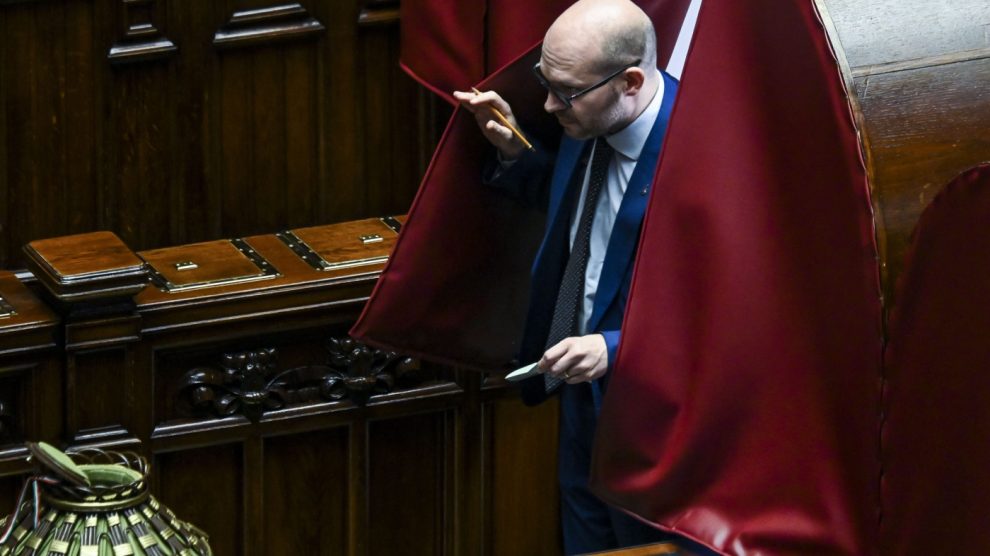Lorenzo Fontana, a close ally of the League’s leader Matteo Salvini, is the new Speaker of the Lower House in Italy, the State’s third-highest official.
- Ignazio La Russa, a founding member of Giorgia Meloni’s Brothers of Italy, became the new Speaker of the Senate – the State’s second-highest official – on Thursday.
A profile. Mr Fontana was elected to the Lower House in 2018 and became deputy speaker. He was Minister for Family and Disability in the first government led by Giuseppe Conte, formed by the Eurosceptic and anti-establishment parties Five Star Movement and League. In 2019, in the final weeks of that government, he was Minister for European Affairs.
- He also was an MEP from 2009 to 2018, and head of the League’s delegation since 2012.
- He is very involved in the fight against so-called gender theories. He has declared himself against abortion, civil unions and gay marriage.
- He has come out strongly against economic sanctions on Russia, which he considers a “model” in ethical and social terms.
A Putin admirer. Mr Fontana is a strong admirer of Russian President Vladimir Putin. In 2014, he was one of Crimea’s “international observers” of the sham referendum. He has repeatedly campaigned against sanctions: in September 2014, he wore a “No sanctions against Russia” in the European Parliament along with Mr Salvini.
To break the stalemate over the name of next Chamber of Deputies speaker (3rd most important post in Italy’s institutions) Salvini’s Lega proposes former MEP Fontana. The pic you’ll see everywhere in the next hours is of him wearing a t-shirt against sanctions on Russia from 2014 pic.twitter.com/6MwmHnI7do
— Gerardo Fortuna (@gerardofortuna) October 13, 2022
- If Russia had wanted to invade Ukraine, “it would have already done so,” he said during an interview with Il Foglio two weeks before the Russian invasion. “Russia’s is the position of someone [who’] trying to have a strong stance in a negotiation,” he added.
- In September, he told Libero that “whoever invades a sovereign country is always wrong.” He also added that “asking to review sanctions on Russia is not pro-Putin, but pro-Italian […] we made it clear that being against sanctions does not mean supporting Russia.”
- Mr Salvini’s close links to Russia are well-documented. In March, after the Russian invasion of Ukraine, the League tacitly renewed its cooperation and information-sharing deal with Mr Putin’s United Russia party.
The Verona-Moscow connection. In 2017, Mr Fontana became deputy mayor of Verona, his hometown. In Verona, he participated in the events organised by Conoscere Eurasia, an association led by Antonio Fallico, honorary consul of the Russian Federation in Verona and president of Banca Intesa Russia. After recent international developments, the Verona Eurasian Economic Forum will relocate to Baku this year, as previously reported by Decode39.
- Verona has also been home to the territorial office of the separatist Republic of Donetsk since well before the war in Ukraine, testifying to the city’s strong ties with the Russian and Russian-speaking community.
- At the World Congress of Families, organised in Verona in 2019 under his Ministry, he had Alexey Komov as the primary guest. The latter worked for the foundation created by Konstantin Malofeev, a Russian oligarch under sanctions.
Troubles for Meloni? During a CEPA event, Lewis Eisenberg, former US ambassador to Italy under the Trump administration, stressed the “crucial importance” for Ms Meloni – likely the future prime minister – to appoint the “appropriate” people for the new government.
- He emphasised the ties that Mr Salvini and Silvio Berlusconi have with President Putin, and he described Giancarlo Giorgetti, a prominent member of the League as well as a staunch Atlanticist, as one of “the most capable” politicians in Italy.
- “In case [Mr Fontana] takes positions that go against Atlanticism and pro-Europeanism – and I exclude that this could happen – we will not fail to point him out and intervene,” said Giorgio Mulè, a prominent member of Forza Italia, Silvio Berlusconi’s party.
Pros and cons for Meloni. The Lower House speaker’s office in Italy differs from his counterpart in the United States (just think of Lower House Speaker Nancy Pelosi’s visit to Taiwan, and the reactions that ensued).
- The president of the Italian Lower House, instead, often maintains a bipartisan and institutional role. Therefore, if he has a pro-Russia agenda, it would be hard for him to carry it forward from that post.
- Still, he does represent the Lower House abroad. And this could spell international troubles for Ms Meloni, who personally campaigned for the election of Mr Fontana.





